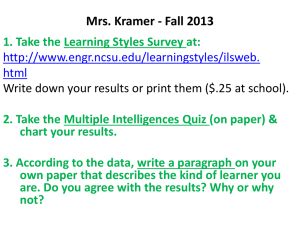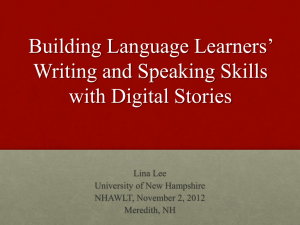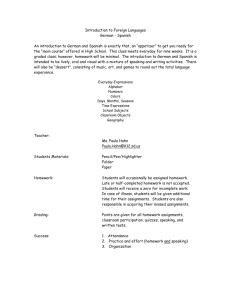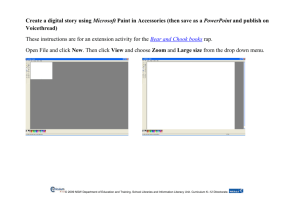SPAN 330: Cultural History of the Hispanic World
advertisement
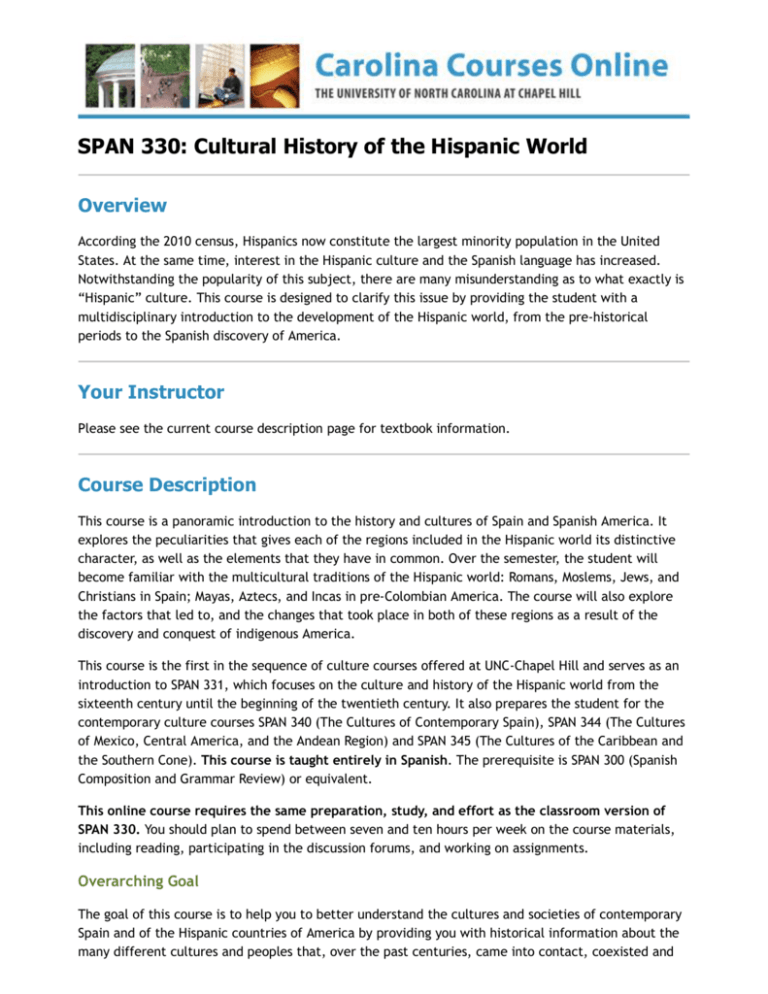
SPAN 330: Cultural History of the Hispanic World Overview According the 2010 census, Hispanics now constitute the largest minority population in the United States. At the same time, interest in the Hispanic culture and the Spanish language has increased. Notwithstanding the popularity of this subject, there are many misunderstanding as to what exactly is “Hispanic” culture. This course is designed to clarify this issue by providing the student with a multidisciplinary introduction to the development of the Hispanic world, from the pre-historical periods to the Spanish discovery of America. Your Instructor Please see the current course description page for textbook information. Course Description This course is a panoramic introduction to the history and cultures of Spain and Spanish America. It explores the peculiarities that gives each of the regions included in the Hispanic world its distinctive character, as well as the elements that they have in common. Over the semester, the student will become familiar with the multicultural traditions of the Hispanic world: Romans, Moslems, Jews, and Christians in Spain; Mayas, Aztecs, and Incas in pre-Colombian America. The course will also explore the factors that led to, and the changes that took place in both of these regions as a result of the discovery and conquest of indigenous America. This course is the first in the sequence of culture courses offered at UNC-Chapel Hill and serves as an introduction to SPAN 331, which focuses on the culture and history of the Hispanic world from the sixteenth century until the beginning of the twentieth century. It also prepares the student for the contemporary culture courses SPAN 340 (The Cultures of Contemporary Spain), SPAN 344 (The Cultures of Mexico, Central America, and the Andean Region) and SPAN 345 (The Cultures of the Caribbean and the Southern Cone). This course is taught entirely in Spanish. The prerequisite is SPAN 300 (Spanish Composition and Grammar Review) or equivalent. This online course requires the same preparation, study, and effort as the classroom version of SPAN 330. You should plan to spend between seven and ten hours per week on the course materials, including reading, participating in the discussion forums, and working on assignments. Overarching Goal The goal of this course is to help you to better understand the cultures and societies of contemporary Spain and of the Hispanic countries of America by providing you with historical information about the many different cultures and peoples that, over the past centuries, came into contact, coexisted and influenced one another in the process of developing what we today is widely known as Hispanic culture. Course Objectives To acquire a good understanding of the integrated history of Spain and Spanish America, from prehistoric times to the Spanish discovery and conquest of America. To acquire a critical understanding of the past in order to better understand contemporary Spanish and Spanish-American societies and cultures. To develop an understanding of the cultural diversity and richness of the Hispanic world. To improve Spanish speaking skills through the participation of a discussion forum. To improve Spanish writing skills by writing and revising homework assignments and a final research paper. Texts Please see the current course description page for textbook information. Class Procedures and Policies The course will follow the UNC-Chapel Hill academic calendar. The schedule accommodates University holidays. Each thematic lesson will guide you through activities and will include a variety of assignments. Some of these assignments will be graded for content, while others will be part of your participation grade. There are thirteen lessons. See the Schedule for lesson dates and assignment due dates. In general, we will cover one lesson per week, but during the shorter summer term we will cover two lessons in some weeks. 1. Los primeros pobladores de la Península Ibérica y América 2. La Hispania romana 3. Civilización y cultura maya 4. Cem Anáhuac: El mundo de los aztecas 5. Tawantinsuyu: El imperio de los incas 6. La literatura de las civilizaciones precolombinas 7. La sociedad medieval española: la convivencia de tres culturas 8. La literatura en la Edad Media 9. Unificación y expansión: la Reconquista y los Reyes Católicos 10. Entre dos mundos: Europa a finales del siglo XV, el Renacimiento y el “descubrimiento” de América 11. La literatura del Renacimiento español 12. La conquista de la América indígena 13. Las crónicas del Nuevo Mundo Assignments and Deadlines Individual assignments that do not require peer feedback may be turned in any time before the assigned deadline. You must notify the instructor if you need to turn something in late. Discussion postings for each lesson must be made by the deadline date. All tests must be completed by the deadline indicated. In general, late work is not accepted and assignment deadline extensions are not granted, except in the most extreme cases of extenuating circumstances (family death, documented extended illness, religious observance). If you are unable to complete an assignment by its due date, contact your instructor as soon as possible to make alternative arrangements. Attendance and Participation Participation is very important and is required for this course. To be considered in attendance during a given week, you must post to the discussion forum at least once and meet your posting commitments. Quantity and quality are both important considerations when it comes to participation. Quantity is discussed above. Quality means adding something of substance to the discussion—your perspectives and ideas, examples from your work or life experience, questions, and so on. A message that says simply, “I agree,” for example, would not constitute participation since it does not add anything of substance to the discussion. You will find it much easier to keep up with an online class, and gain more from it, if you are logging in and participating daily. Instructor’s Responsibility Your instructor will be responsible for communicating with you clearly and promptly on any issue that might come up. I will respond to your emails within 24 hours and will have your assignments (homework, quizzes, exams, and so on) graded, commented on, and returned within three days of submission. I will provide you with constructive feedback and clear criteria (usually in the form of comments in your assignments) for the evaluation of your work. Assignments, Evaluation, and Grading Your final grade in the class will break down as follows: 15 percent: Written Assignments (3 worth 5 percent each) Three times during the semester you will be required to submit a written assignment indicated “PARA ENTREGAR” in the weekly assignments. There are five weeks with these “tareas,” but you are responsible for submitting only three of them. The tareas consist of short written assignments (approximately one page), to be completed in Spanish and submitted to the instructor via email. These assignments will be graded for content and clarity of explanation, including grammar and vocabulary. 5 percent: Weekly Assignments Each week, you will submit an assignment related to the lesson or lessons discussed. These will vary in format and in length. These brief assignments will not be given a grade, but you will get credit for completing it and turning it in on time. 10 percent: Participation in Online Discussion via VoiceThread Our class discussion forum is hosted on VoiceThread (there is a link in the navigation list at left). VoiceThread allows us to communicate with each other using text, audio, images, and even video. Instructions for using VoiceThread will be provided. Each week, the instructor will present a topic or question that has been designed to challenge you to go beyond the readings and allow you to express your understanding of some important topics. You will be required to speak in Spanish in the forum and you will be evaluated on participation and content, rather than language. You are required to participate a minimum of 8 times during the summer term. 20 percent: Research Paper (5 percent for the rough draft, 15 percent for the final draft) At the end of the term, you will submit a research paper written in Spanish on a topic of your choice. There is no limitation of topic other than that it must be related to the material covered in the course. In this project, you will assume a critical position on a given topic and defend your position with logical and convincing arguments. Before writing the paper, you will submit a topic and outline to the instructor for approval. This outline must include a clear thesis and the major points that support the critical position taken. Once approved, you will turn in a rough draft along with a preliminary list of works consulted. This rough draft will be graded for content and will represent 5 percent of the final grade. The final paper will consist of six to seven pages, typed (font size 12, double-spaced, 1 inch margins) and MUST include an introduction, a clearly stated thesis, a well developed exposition with convincing supporting arguments, a conclusion, and a list of works consulted. You must consult at least six different RELIABLE sources of information. Of these, no more than three can be in English. The paper will not only be graded for content, but also for organization, logic, vocabulary, and grammar. 30 percent: Quizzes (3 worth 10 percent each) There will be three quizzes (pruebas) during the semester. The dates for the quizzes are listed in the Schedule. Once opened, you will have 30 minutes to complete each quiz. The instructor will provide study guides before each quiz. 20 percent: Final Exam Following University requirements, there will be a final exam. The exam will be comprehensive. The exam date is listed in the Schedule. Once opened, you will have three hours to complete the exam. Class Discussion on VoiceThread To start using VoiceThread, click on the VoiceThread link at left, or go to voicethread.unc.edu. Click Sign-in/Register. When prompted for a user name and password, enter your Onyen and password. A terms-of-use agreement will be displayed. Read the agreement, and click Yes to accept the terms. Your VoiceThread account has now been created. Click on the Help feature at the upper right-hand corner of the main VoiceThread page. This will bring you to the VoiceThread FAQs, and a link to a series of short tutorials. Start with “What’s a VoiceThread,” “How To Share,” “1 Minute Voice Thread,” and “VoiceThread Presentations.” There are also short introductions to the Doodler and Zoom tools, and instructions for setting up your microphone, webcam, and more. Once you’ve logged in to VoiceThread, you’ll want to customize your profile and set your microphone up right away. I have created a VoiceThread group for this class, and that is where you’ll comment on the lessons, and where you’ll find others’ VoiceThreads to read, listen to, and comment on. To join the group, first create your VoiceThread profile as described above. Then click on this link to subscribe to our group: ________. To make sure you’ve successfully joined the group, log in to your VoiceThread account and click on “My Voice.” On the left-hand side of the page, you should see the group appear under the heading “Groups.” Click on the group to view its contents. Each time you create a VoiceThread, share it with the class, following the instructions in the VoiceThread called "Sharing with a Group." If you experience technical problems with VoiceThread and have already gone through the steps listed above, contact ITS HELP at help.unc.edu. The response team is available twenty-four hours a day, seven days a week by phone (919-962-HELP), e-mail, online request form, or live chat. Academic Policies By enrolling as a student in this course, you agree to abide by the University of North Carolina at Chapel Hill policies related to the acceptable use of online resources. Please consult the Acceptable Use Policy on topics such as copyright, net-etiquette, and privacy protection. As part of this course, you may be asked to participate in online discussions or other online activities that may include personal information about you or other students in the course. Please be respectful of the rights and protection of other participants under the UNC-Chapel Hill Information Security Policies when participating in online classes. When using online resources offered by organizations not affiliated with UNC-Chapel Hill, such as Google or YouTube, please note that the terms and conditions of these companies and not the University’s Terms and Conditions apply. These third parties may offer different degrees of privacy protection and access rights to online content. You should be well aware of this when posting content to sites not managed by UNC-Chapel Hill. When links to sites outside of the unc.edu domain are inserted in class discussions, please be mindful that clicking on sites not affiliated with UNC-Chapel Hill may pose a risk for your computer due to the possible presence of malware on such sites. Honor Code As a UNC student, you are expected to uphold the University’s Honor Code. All work that you produce must be your own! Plagiarism is a serious offense and will not be tolerated in this course. Be sure that you understand the correct way to cite scholarly material when completing assignments by consulting the Chicago Manual of Style. If you have any additional questions about what constitutes plagiarism, or how to properly cite a source, please contact me. Please view this brief Plagiarism Tutorial created by the librarians of UNC-Chapel Hill, Duke University, NC State University, and NC Central University. Lessons Lessons Additional assignments Lección 1: Los primeros pobladores de la Península Ibérica y América Lección 2: La Hispania romana Lección 3: Civilización y cultura maya QUIZ 1 Lección 4: Cem Anáhuac: El mundo de los aztecas Research paper topic and outline due Lección 5: Tawantinsuyu: El imperio de los incas Lección 6: La literatura de las civilizaciones precolombinas QUIZ 2 Lección 8: La sociedad medieval española: la convivencia de tres culturas Rough draft of research paper due Lección 9: La literatura en la Edad Media Lección 10: Unificación y expansión: la Reconquista y los Reyes Católicos Lección 11: Entre dos mundos: Europa a finales del siglo XV, QUIZ 3 el Renacimiento y el “descubrimiento” de América Lección 12: La literatura del Renacimiento español Lección 13: La conquista de la América indígena Lección 14: Las crónicas del Nuevo Mundo Final version of research paper due Repaso para el examen final Final Exam © The University of North Carolina Send comments and questions to fridaycenter@unc.edu.

